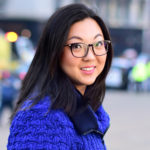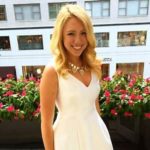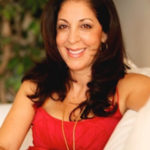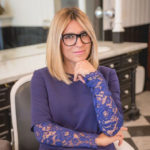There isn’t a textbook or college class about navigating your twenties and thirties. But Ann Shoket has written a guide for taking ownership of your personal and professional life and crafting a life you love.
As editor-in-chief of Seventeen, Shoket helped hundreds of thousands of people traverse their teenage years. Shoket realized there wasn’t a similar space for big questions — like how to choose the right career path, negotiate a raise or find a partner whose eyes light up when you talk about your goals — so she decided to do some research and write a book.
Shoket hosted Badass Babes dinners — think candid conversations over fancy frozen pizza and rosé — with dozens of women (and a few men) and incorporated their insights and her own into her book, “The Big Life: Embrace the Mess, Work Your Side Hustle, Find a Monumental Relationship, and Become the Badass Babe You Were Meant to Be.”
We met for coffee at the carefully curated women-only coworking space we go to, The Wing, and spent an hour discussing her career path and advice. I left feeling motivated and inspired — so much so that I bought frozen pizza and rosé and invited a few of my friends for dinner that evening.
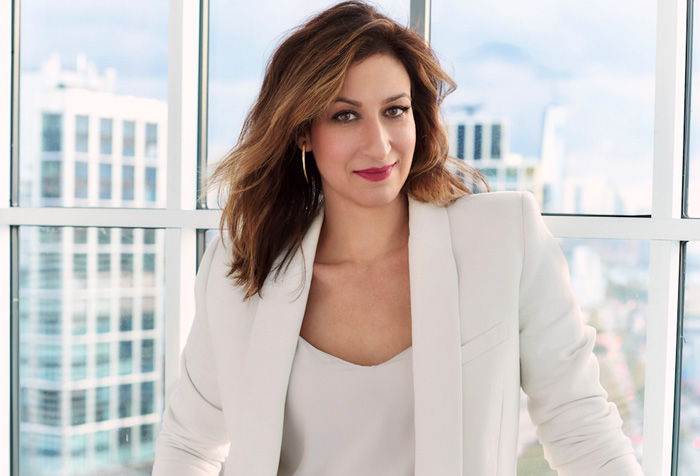
I’m going to borrow a question you ask at your Badass Babes dinners. When you were 16, what did you imagine your life would be like?
The reason I start there is because when you’re 16, it’s the first moment in your life when you can pick up your head and see your possibility in the world. You are pure potential in that moment. You’re not beholden to one city, everything is possible and the world is laid out for you. I’ve interviewed a lot of very famous women in the world and I’ve asked them all that question. They all can remember exactly what they wanted to be when they were 16. Even if they didn’t know what the job would be, or what the family would look like, it was the feeling that they wanted to have in their life. That all comes from that dream.
That didn’t come into clear picture until recently when I asked myself what I wanted to be when I was 16. I remember so vividly that I was sitting in my punk rock friend, Jen’s bedroom, eating Cool Ranch Doritos and probably listening to The Dead Kennedys and Sex Pistols. I told her that I wanted to move to New York City and be a writer. She said to me, “I’m dubious,” through a lot of black eyeliner and her bright pink bangs. I remember feeling so stunned — I didn’t even know what dubious meant. I was like “I know that’s not good,” but I had to go and look it up. I stopped talking to her about my dreams. She was not on my team. But I never stopped wanting that dream, and especially the New York part.
I grew up in the suburbs of Philadelphia, and I wanted to move to New York City. I wanted the adventure, I wanted to go to amazing parties and talk to authors and editors and makeout with rockstars. I remember that so vividly. And I made it to New York City. I came here to go to New York University.
What was your career path?
My first job out of school was at The American Lawyer, which is nobody’s idea of a dream job. I was a fact-checker and an assistant, which was phenomenally boring. I had the good fortune that the magazine was run by the legendary journalist, Steve Brill. I didn’t know he was legendary, I just knew he was this journalist who stomped around the newsroom with a cigar and yelled at people and threatened to fire me on week two. It’s actually a badge of honor — it’s a small and elite group of people who Steve Brill threatened to fire.
I learned everything I know about journalism in that job. I didn’t take a lot of journalism classes at NYU. I learned everything about journalism — how to put a story together, how to be a great reporter and how to ask nosy questions and get a good answer. Steve Jobs once called me for fact-checking. (Which is crazy, I had to fact-check the most simple thing, and I remember I had to fax him the fact-checking questions, but he wanted to call me and tell me whether what he said was right or not. But isn’t that weird that it was a fax. We had email then, but he called me and said “Hi Ann, This is Steve Jobs. Everything you said is correct,” and then he hung up. So that was a big moment there.
Two other interesting things happened. I was there when O.J. Simpson took his ride down the California highway in his white Ford Bronco. We all watched it on the TV in the conference room, and suddenly legal journalism wasn’t so boring anymore. The other is that The American Lawyer was a magazine, a group of newspapers, an online service for attorneys and “CourtTV,” so for me, it was not only about learning the basics of journalism but also learning the new way that journalism businesses would be built. It was about finding your audience, being important to your audience and being able to reach them in every way. This was the beginning of my multi-platform education, which became my trademark as an editor.
I’ve always been interested in audience first, specifically young women first, and how I can serve them on any platform. People who talk about the end of print or digital are missing the point. The point is that it is the conversation that matters — it’s the conversation you are having with young women about the things that are important in their lives.
From The American Lawyer, I went to a teen magazine called React and from there I went to join the launch team of CosmoGIRL.That’s when I realized who my audience was, what was important to me and how meaningful it would be to talk to young women about becoming the women they were meant to be. It was also phenomenally fun to launch a magazine in 1999 when everyone was on fire with launching startups. I put my heart and soul into launching that magazine. I worked all the time, but it felt meaningful because we were doing something new and interesting.
I stayed at CosmoGIRL for eight years, then the opportunity came to pitch to be editor-in-chief of Seventeen. I got that job in 2007. So think about 2007, it was the year of Lauren Conrad, and everyone wanted to be blonde and drive their Mercedes SUV through Southern California with the windows down. You wanted to drink Frappuccinos with your friends and gossip about boys. Life was good. Affluence was almost expected and the economy was booming. We actually sold more issues of our August issue in that year than any other issue ever in the history of the magazine. It was an amazing time to have joined Seventeen.
I repositioned the magazine to focus on what was happening in the world. It was fun to be seventeen. That was the tagline that I came in and positioned the magazine with because that was what was happening in the world. Fast forward two years and we had a terrible, crushing recession. We were shopping in our closets and making our Frappuccinos at home. It was not so fun to be anybody — much less seventeen.
We repositioned the magazine again to tap into the reality of the world that young women were living in. We launched a money column and we focused on serious issues about what was happening in the world and a strange thing happened. This generation of young women who had been promised affluence and success without a lot of hard work sort of had the rug pulled out from under them. Rather than moan and complain, see their college dreams disappear or feel desperate under a difficult job market, this generation of young women got really mobilized to take control of their future. Success would be on their terms. One of the young women in my book said, “You had a choice to either bet on a system that was broken or to bet on yourself.” A whole generation of women bet on themselves.
I saw it very close to home when suddenly I started to get an onslaught of Facebook and Twitter messages from people asking how to get started in business. That was a big shift: They didn’t want to know about fashion and beauty — they wanted to know about success. At the same time, I got invited to give a speech about how to get started in business. I really felt there was a big cultural shift that was happening. We had done an entire issue about girl power. We asked young women what power meant to them, and they said independence and giving back, which is so different than what a generation before them thought of as power — money and fame. I really felt we were at the beginning of a major cultural revolution.
What inspired you to write The Big Life?
When I left Seventeen in 2014, the magazine had been reorganized and they reduced the staff in half and the frequency to six times per year. I knew very quickly that I wanted to continue the conversation with this generation of women who had grown up with me. I wanted to continue to the next stage of their lives.
It never made sense to me that these deep, emotional conversations ended. The stakes are even higher in your twenties and thirties — you’re on your own, you do not have a safety net and the questions in front of you are even more complicated. It’s not endless possibility and pure potential. You’ve got bills to pay and student loans to pay back and real life problems that have real life consequences. That was where “The Big Life” comes in. It’s especially pertinent for this generation of women because career, ambition and success are the center of their lives. The question is, how do you put together the pieces of your life?
I thought the part about your success squad versus your friend group was so true.
Your friends are your friends. You don’t want to grind them away endlessly with questions about where you’re going in your life, how to get there and who they know. That’s not what your friends are there for. Your friends are there to go to concerts, hang out, eat pizza and text about dudes. That’s what your friends are for.
Your squad is your chicks who are bonded together over your mutual ambition to succeed and achieve. You’re devoted to helping each other achieve and succeed. Not everyone in your squad needs to know each other — this is your team and your sisterhood. I talk about that in my book — you need someone who is an insider, who is well-known and knows all the ropes about how things go and can give you a little bit of insight and some perspective into what’s happening to you. You need the wing woman. You need the connector. There is nothing worse than when people don’t introduce you to people. You need someone who says, “You need to know so and so. I will introduce you.”
My squad didn’t happen until much later in my career. It’s important that you offer your squad as much as they are giving you. Your squad is important, especially when you’re working on something new. That kind of sisterhood and support is really invaluable when you are trying to do anything hard and difficult in the world, like succeeding.
That’s a good segway into your Badass Babes dinners. How did you decide you wanted to host those as an approach to writing the book?
Pizza dinners are something we do in magazines all the time. Everybody loves pizza, and the good thing about pizza is that you can’t eat an entire pizza by yourself. You have to share with your friends and your sisters. I didn’t know the pizza dinners would become “a thing.” I thought it would be a one-off. I had this realization as I was putting together the ideas for the book and I realized that what I didn’t know much about was relationships and sex. I thought, let me have some women come to my house and talk to me about this. So I invited one young woman that I knew, and I said to bring a friend and friends of friends. I made a killer cheese plate, opened a lot of bottles of rosé and made a fancy frozen pizza from Fresh Direct.
We talked about relationships and men for about five minutes. We spent the rest of the conversation talking about our hopes, dreams, fears, the things that are standing in our way from getting the “Big Life,” the things that are keeping us up at 3 am and this amazingly crushing pressure to be perfect.
These women were telling me that they felt like they had to be “on” and perfect all the time, and not just in-person, but on Instagram and Facebook. They thought they needed to project an always-on, sunshiny view of what life is like, and it doesn’t leave any room for vulnerability, mistakes and failure or dark crazy f-ed up emotions. Because they were struggling because they felt so isolated, they were hurting themselves. They talked about this really self-harming behavior, drinking, drugs, cutting or eating disorders. All this came out in the first dinner, it went on for hours, and at the end of the dinner when everyone went home I went and said to my husband, “That was the most amazing dinner I ever had. I feel like my brain is on fire. I need to do that again.” So I did. Every time was a different group of women. I did maybe two dozen dinners. I’m continuing to do them because they are so valuable and important to me.
I did a couple dinners with men. I was terrified to do those dinners. I knew I would have to, but I kept putting them off. I was terrified about it because I have such a warm rapport with women. I get them, frankly, we grew up together. But with men, I felt like it was a jungle.
I did two dinners, one with single men and one with coupled up men. I heard two things with women at my table. I heard that when they talked about their ambition, the person they were dating wasn’t necessarily down with their ambition, especially when the rubber hit the road and there was an actual conflict between two careers. There were all these ways you could drain the life out of a relationship if you weren’t on the same page about priorities.
I also heard some interesting new dynamics around partnership and marriage. That’s what I wanted to ask the coupled people about. There was this one person I’ve known for a long time. I never saw her date, then all of a sudden she turned up with this amazing guy and he was perfect. He was so kind, supportive and down with her ambition. What I thought was so special about that, is that she almost opted out of all of the other crap about dating. She sort of sat on the sidelines waiting for the moment she met the guy. She held her standards high. I thought that was pretty great. So often we think: “I just don’t want to be lonely,” or, “I don’t want to be alone,” and I was so impressed by her.
I wish I could figure out how to make it easier for young, hungry, dynamic, ambitious women to find the partners that they need. It is not, however, all the men’s fault. There are still a lot of reservations we have about what dating and relationships “should” look like. Until we get rid of those ideas about the things we “should” do, we’ll never get the partnership we need.
It’s unlikely to be the dynamic your parents had or even people a little bit older than you had. To hem yourself in with old rules, like that you need to have it all buttoned up by the time you are 30, your partner needs to match you in ambition or that it will be really hard and complicated to have a family and a big career, all hold you back from crafting the life you want on your own terms.
There are endless possibilities, I talk about the story of when I met my husband because it shows possibilities for how life can go. I was 35 when I met the man who would be my husband. I had spent a long time dating in New York and no one connected. No one set my brain on fire. I became editor-in-chief of Seventeen when I was 34, and it intimidated a lot of men. A lot of men who had been in my circle were suddenly weird about my new job. I had to sort out what that meant, but I didn’t have a lot of time for dating or sorting things out because I had a new big job I had to do.
I was almost okay with the idea that I was not going to get married. I’d adopt or use a surrogate. I was thinking through all the possibilities because that was how my life was going, and I didn’t want to settle for a partnership that didn’t feel right. I was out with my girlfriends about 10 months into becoming editor-in-chief so my hair wasn’t on fire every five seconds, and I had a moment to go out and have a good time. We were at a bar on the Lower East Side, and I started talking to the guy sitting next to me. We hit it off and had a great conversation. We were immediately excited about each other — I thought he was so interesting, so dynamic and so cool. And when I told him about the things that mattered to me, I could see he was excited. I describe it as his eyes lit up when I talked about my ambition. And it really happened. I hadn’t seen that in awhile and so that was it. There was this interesting guy, on a random night out, and we just connected and decided to live a life together.
I tell that story for two reasons. For women who get hung up on the idea that things have to happen by the time you’re 30 — I was 35. I was 39 when we got married, 40 when my son was born and 42 when my daughter was born. That’s not how I thought my big life would go. But that’s how it worked out.
What is your best advice for millennial women?
If you take nothing else from my book, take this one message. Get rid of the idea of the way things “should” be. Craft a life that works for you on your own terms. Free yourself from old ideas and restrictions about life, work and love. Be true to what matters to you, and chase the things that matter.








